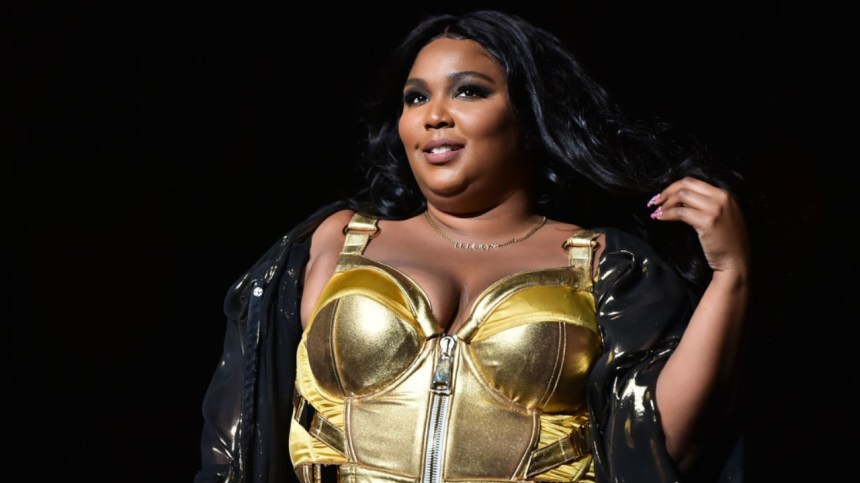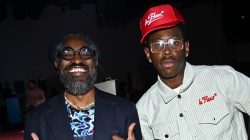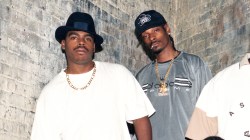Lizzo has been transformed into a Madame Tussauds wax figurine and the creative polymath isn’t sure how she feels about it.
The wax caricature was revealed at Madame Tussauds Las Vegas location on Wednesday (February 1) and Lizzo took to Twitter to celebrate the moment, which she called: “Single-handedly one of the most terrifyingly meta moments of my life.”
“Thank you @MadameTussauds,” she continued. “Now I know what a twosome with Lizzo is like.”
Check out Lizzo with her new waxwork in the clip below:
Lizzo is just the latest artist to be commemorated with her own wax figurine. Nipsey Hussle and Missy Elliott were both immortalized in wax last year, and a not-nearly-as-lifelike Nicki Minaj wax statue was unveiled at Madame Tussauds Berlin location in 2020.
More recently, Kanye West‘s figure was removed from the London museum entirely following the Yeezy mogul’s anti-Semitic tirades last year.
The wax creation comes after Lizzo also dropped off the music video to her song “Special,” which features the 34-year-old as a Marvel-esque superhero. In a follow-up post on Instagram, Lizzo said she got the idea for the music video after realizing she should inspire others to start “saving” themselves just as she did.
“This was the seed that planted the Special music video,” she wrote. “Every night on stage I say ‘thank you for supporting me. For loving me. And when you see someone that looks like me in the Real World, keep that same energy.’ What good is representation if I’m the only one benefiting? This video is for any one who has felt unseen, alone, disrespected.”
She spoke more on some of the criticism she’s faced in a previous interview with Entertainment Weekly and opened up about the backlash she’s experience over the years for not making “Black enough” music as a pop star.
Lizzo added that the idea of a genre alone is racist and that the music industry has often relied on genres to keep Black creatives from exploring white-dominated spaces like pop.
“Genre’s racist inherently. If people did any research, they would see that there was race music and then there was pop music,” Lizzo said. “And race music was their way of segregating Black artists from being mainstream because they didn’t want their kids listening to music created by Black and brown people because they said it was demonic.”
She continued: “We forget that in the late ’80s and the early ’90s, there were these massive pop diva records that were sang by Black women like Whitney Houston, Mariah Carey. And I’m giving that same energy. I’m giving that same energy with a little bit of rap, and I think that people just have to get used to me.”

![Method Man Admits He Didn't Like Drake's "Wu-Tang Forever": "I [Wasn't] Getting On That"](https://hiphopdx.com/wp-content/uploads/2025/12/method-man-drake-wu-tang-forever-remix.jpg?w=250)








Has she even dropped a classic
No, but I’m sure she’s dropped a Buick or two in the giant whirlpool she calls a toilet after eating lunch.
That’s a lot of Yankee Candles….
Drop her in Russia right now and I guarantee that’ll end that whole war and create another Grand Canyon in the process.
I’m sure you assholes in the comment section all look swimmingly and have women fawning all over you, huh?
Nigs on the internet are *always* better than what they shit on, am I right?
Nope, Just real n***** telling it like it is about her. Nobody wants someone who constantly talks shit about people but cries that everyone is shaming her when they do it back to her. She’s hypocrite or better yet a hippocrite.Bitch needs to grow up already.
NOOOOOO!!! She’s fat enough already. She doesn’t need to grow anymore.
Shut yo simp ass up!
Being fat will never be cool. Labels found a dumb bitch willing to push a dumb agenda. Nothing to see here
“We forget that in the late ’80s and the early ’90s, there were these massive pop diva records that were sang by Black women like Whitney Houston, Mariah Carey.”. Wtf. What do you mean we forget black artists saw success? The 50s and 60s spawned some insanely popular and successful black artists, from blues, to funk, then to rock n roll. She thinks she’s some trailblazer by being a black pop star lol, like nah, MJ was doing that over 60 years ago.
The only reason she is blazing trails is because the tracker’s frame she rides in on literally is scraping the road, creating sparks.